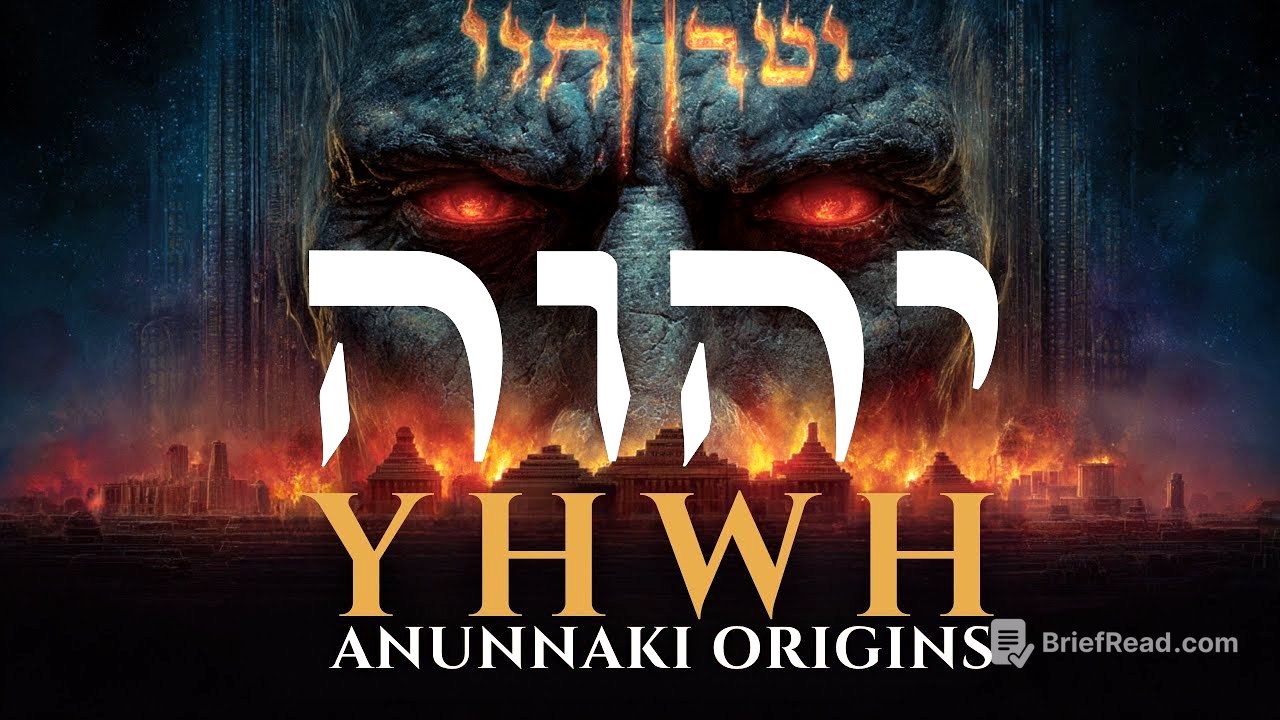TLDR;
This video explores the origins of Yahweh, the God of the Bible, by examining potential connections to ancient Mesopotamian religions, particularly the Anunnaki. It discusses evidence suggesting Yahweh may have evolved from a regional deity within a larger pantheon, influenced by Sumerian, Babylonian, and Canaanite traditions. The video touches on the Divine Council, the plural form of Elohim, and parallels between biblical stories and Mesopotamian myths like the flood and the Garden of Eden.
- Yahweh's origins may be rooted in ancient Mesopotamian religions.
- The term "Elohim" and the concept of a Divine Council suggest a polytheistic background.
- Biblical stories share similarities with Sumerian and Babylonian myths.
Yahweh [0:00]
Yahweh is revered as the God of Abraham, Moses, and the prophets, and the creator of the heavens and the Earth. However, the video questions whether this familiar story of Yahweh's supremacy conceals an older truth. It suggests that Yahweh's origins may be part of a lineage stretching back to the dawn of human civilization and the Anunnaki gods of Sumer and Babylon. The video explores whether Yahweh could be a reimagining of one of these ancient Anunnaki gods, once part of a pantheon before becoming the singular deity known today.
Intro [1:46]
This section serves as an introduction to the topic, setting the stage for an exploration of Yahweh's origins and potential connections to ancient Mesopotamian religions.
Yahweh & Ashara [2:38]
The video challenges the common perception of Yahweh as an eternal, all-powerful, and singular deity. Early traces of Yahweh suggest a different story, rooted in a world of competing gods and shared worship. The Bible hints at Yahweh's early connections to regions like Edom, Seir, and Midian, associating him with tribal and desert gods. Ancient inscriptions from the conet AUD site invoke Yahweh of Samaria and his Ashera, suggesting that Yahweh was part of a Divine pair. Ashera, a mother goddess known from ugaritic texts, was worshiped widely in the ancient near East and linked to fertility and protection.
Marduk [4:32]
The video draws a parallel between Yahweh and Marduk, the patron God of Babylon. Marduk was elevated to the head of the Babylonian Pantheon as Babylon grew in power. Similarly, Yahweh's rise from a desert deity to the singular God of Israel reflects a similar pattern. The term Elohim, used to describe Yahweh in the Bible, hints at pagan origins, as it is a plural word often interpreted as Gods but applied singularly to Yahweh. This raises the question of whether Yahweh was once understood as one among many Elohim, a Divine Council of Gods like the Anunnaki of Sumerian myth.
Elohim [5:55]
The term Elohim, frequently used to refer to God, is a linguistic anomaly, as it is plural but treated as singular when referring to Yahweh. In Genesis 1:26, Elohim says, "Let us make man in our image," suggesting a council of gods. Psalm 82 describes Yahweh presiding over a council of lesser deities. Ugaritic texts describe the Canaanite Pantheon led by L and His Council of deities. Yahweh may have originally been one of these Elohim, a warrior God or storm deity Who Rose to prominence over time.
Dilmun [9:25]
The Garden of Eden has parallels in Sumerian myth, with the Sumerians speaking of a paradise called dilmun, a sacred Garden where the gods lived in harmony. Dilmun was a place of eternal life, Untouched by disease or death, much like the biblical Eden. Even the details of Humanity's creation Echo Sumerian traditions, with humans formed from dust in Genesis and from clay mixed with the blood of a sacri IED God in Sumerian mythology.
The Anunnaki [11:17]
The video explores the similarities between the Anunnaki and the Elohim, questioning whether the Elohim could be a reinterpretation of the Anunnaki Divine Council. It suggests that if the Anunnaki were the gods of Humanity's first civilization, their influence would have spread into Babylonian, Assyrian, and eventually Israelite Traditions. The video asks whether Yahweh inherited the attributes of these ancient gods and whether his story began in the temples of Sumer.
Abraham of Ur [12:54]
Abraham, the patriarch of the Hebrew people, provides another link to Mesopotamian traditions. According to the Bible, Abraham was born in ER of the cdes, a city that was one of sumer's great Urban centers dedicated to the Moon god Nana sin. Abraham's connection to this city suggests that his early beliefs and the roots of yahweh's worship may have been influenced by the religious traditions of Mesopotamia.
The Divine Council [14:04]
The Divine council is explicitly referenced in Psalm 82, where Yahweh is depicted standing among the Assembly of the Gods. In Sumerian and Babylonian mythology, the Anunnaki operated as a council of gods led by Anu enlil and enki. The Divine Council also o appears in the Book of Job, where the sons of God present themselves before Yahweh. The video suggests that early Israelite religion adapted and merged El's identity with yahweh's. It concludes by questioning why these older connections were obscured and whether a deeper truth lies beneath these myths.









